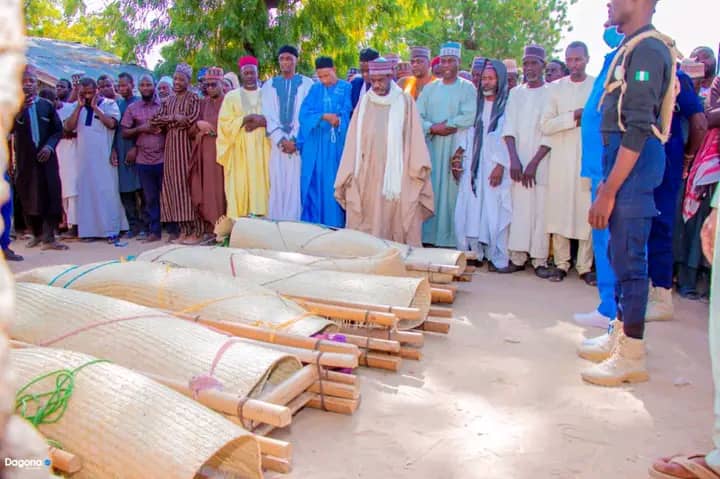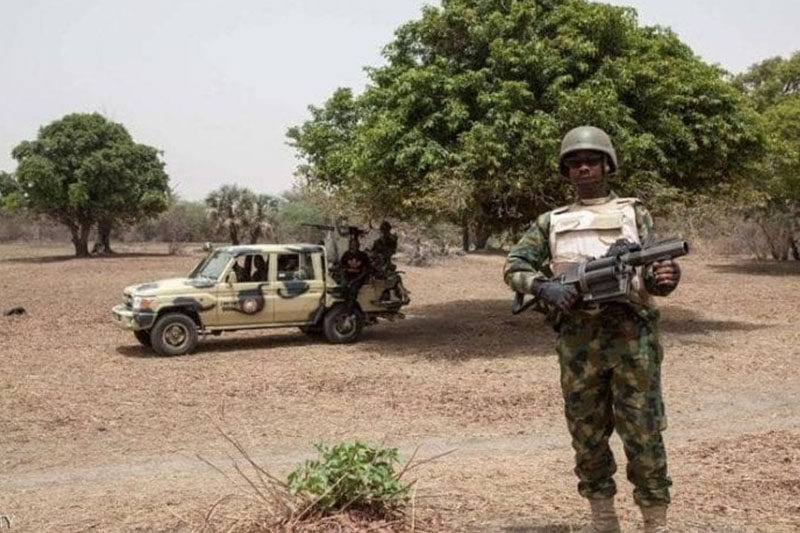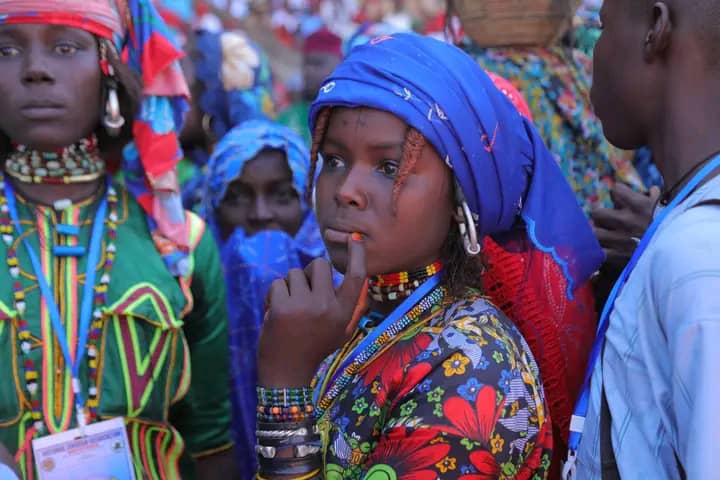A widow with six children, who fled from insurgents in Sambisa Forest, nearly returned to her old ways because the government – which is urging extremists to lay down their arms and give themselves up, promising them they will be taken care of – did not fulfil its pledge and she and her children were left starving and penniless.
But women from Dikwa in Borno State came across Ya Falmata as she was about to leave the town and convinced her to stay, supporting the widow and her children by giving them rice, maize, beans, salt and other foodstuff and necessities.
Falmata told RNI about her life in the forest and in Dikwa, which is in the local government area of the same name.
“Initially I was from Daula, a village deep in the forest. It’s a caliphate ruled by the insurgents. I moved to a stronghold in Sambisa Forest with my first husband who was warrior. But he died on the battlefield. Even though he was dead, I continued to live in Sambisa. After some time had passed, I remarried. My second husband was also an insurgent. We moved to Daula village. Unfortunately, he was also killed on the warfront.”
Falmata could not differentiate between the Jamā’at Ahl as-Sunnah lid-Da’way Wa’l-Jihād (JAS), better known as Boko Haram, and the Islamic State West Africa Province (ISWAP) – an offshoot of JAS, whose members are even more violent and aggressive. The JAS has lost much of its power in recent years. Instead, she described her husbands as warriors.
“After I lost my second husband, I continued to live in Daula with other windows and their children. Their husbands had also been killed in the war against the government. But after a while, many of the families started fleeing from the village. Eventually, the other widows and I held a meeting and we decided – because so many others were fleeing from Daula – to also leave the village.
“We left Daula and arrived at Dikwa town in the dark of night. We couldn’t enter the town because the gate was closed, so we spent the rest of the night at the entrance.
“The next day we were allowed to enter the town. We were taken by security operatives to their headquarters, where we were given food and water.”
Falmata said the security operatives looked after them for almost two months, providing food, water and other essential items.
“Then they profiled us, registering our details and information on a computer. After that, the security operatives and the government stopped giving us food and water. My children and I were left to fend for ourselves. We had to beg on the streets for food and money. We were starving and our living conditions were extremely difficult.
“After some time, we were exhausted because we were so hungry. We were tired of begging, even though we were starving. It’s hard to spend all day on the streets begging. Every day was a struggle. That’s when I decided to pack up our few belongings and return to the forest, where I had come from. I have six children, five of them are my biological children and one of them is an orphan whom I am taking care of.
“I decided to go back to my former ways with the insurgents. The six months my children and I spent in Dikwa were so difficult. Life was hard and we were just not coping. Every day was a struggle. We were starving. It was very hard for me to see my children begging in the streets. And I also hated it. I felt ashamed.
“The government told us that if we gave ourselves up, we would be looked after. But the Borno State government did not keep that promise. Many of those who had tried to settle in Dikwa fled from the town and returned to the forest because they were so hungry and had no money to take care of themselves.
“Living in the forest is not easy and there are also hardships. Sometimes we did not have enough food. But it was preferable to the lives we had in Dikwa.”
Falmata said she and her children were determined to leave Dikwa town and return to Daula village. On their way, while they were resting under a tree, they came across some women fetching firewood in the forest.
“They asked me where I was from and where I was going. I told them I was leaving Dikwa town and was returning to Daula village because of the hardships and starvation. The women sympathised with me. They were empathic. They counselled me and comforted me. They convinced me that it would be better to remain in Dikwa town than to return to Daula.”
Falmata eventually capitulated and followed them back to Dikwa town.
“They were so kind and generous and gave me and the children rice, maize, beans and salt, as well as other foodstuff. Thanks to the humanitarian support I received from members of the community, my children and I are now living comfortably in Dikwa.
“But I want to tell the government that they should keep their promise to support the families of insurgents who have come out of the bush by providing humanitarian aid, such as food, essential items and money because otherwise more people will return to the forest and go back to their former ways. Without support, those who have left the lairs of the insurgents will return. We all need support. We cannot come out of the forest and make it on our own. We need help.”
Alkasoum Aboulrahamane, the permanent secretary of the Sahel Solidarity International Forum and also a security and political commentator, told RNI that government authorities were calling on insurgents to lay down their arms and embrace peace and unity with the promise to take care of them by providing humanitarian support, such as food and other essential items.
“As a result, about 100,000 insurgents and their families have already surrendered and more keep coming out of the bush. But, if the government refuses to fulfil its promises to take care of those who surrender and are repentant, there will be a serious problem because many of the penitent insurgents and their families will return to their former ways and that could stop other insurgents from surrendering.
“I call on people to be patient and accept repentant insurgents when they are reintegrated into the community. Repentant insurgents have to go through months of deradicalisation and rehabilitation processes before they can return to their communities. They have to be truly repentant and prove that they fully intend to change their ways; that they no longer want to fight for the insurgents and instead want to live in peace and harmony within communities.
“I urge the governments of Borno State, Nigeria, Niger, Chad and Cameroon to put in place measures to support these repentant insurgents and their families by providing humanitarian aid. This will encourage many more insurgents to surrender and fast-track the restoration of peace and stability in the Lake Chad region.”
SHETTIMA LAWAN MONGUNO









